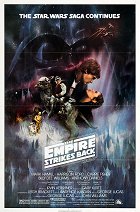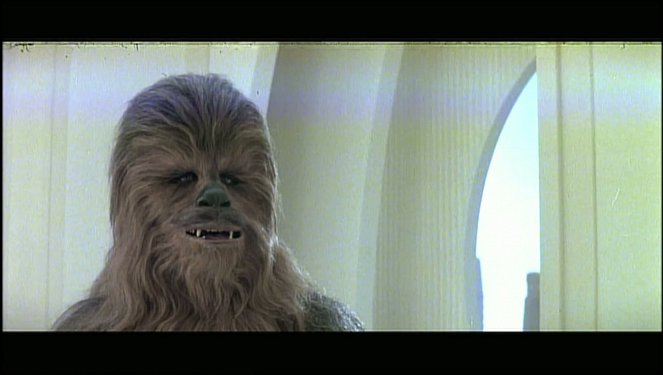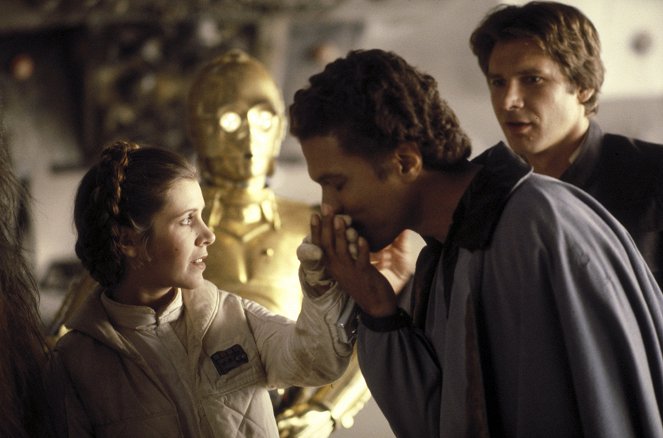Directed by:
Irvin KershnerCinematography:
Peter SuschitzkyComposer:
John WilliamsCast:
Mark Hamill, Harrison Ford, Carrie Fisher, Billy Dee Williams, Anthony Daniels, David Prowse, Peter Mayhew, Frank Oz, Alec Guinness, Jeremy Bulloch (more)VOD (4)
Plots(1)
Three years later Imperial forces continue to pursue the Rebels. After the Rebellion's defeat on the ice planet Hoth, Luke journeys to the planet Dagobah to train with Jedi Master Yoda, who has lived in hiding since the fall of the Republic. In an attempt to convert Luke to the dark side, Darth Vader lures young Skywalker into a trap in the Cloud City of Bespin. (official distributor synopsis)
(more)Videos (4)
Reviews (10)
The Empire Strikes Back establishes the central paradox of Star Wars fandom – its qualities are predominantly not the work of George Lucas, so the instalment that is adored by all and to a great extent defines the franchise is paradoxically an anomaly within the saga. The first Star Wars laid out the world of a galaxy far, far away and, as an update of old naïve sci-fi adventures in the mould of Buck Rogers and Flash Gordon, was intended to be a spectacle for children. Thanks to that, Lucas was able to make money from merchandising, which at the time was not yet targeted at the fat wallets of fans, but only family budgets. With The Empire Strikes Back, the franchise was catapulted to cult status in the sense of lifestyle. With its adult conflicts, tense emotions and brilliant dramaturgical structure, the second (now fifth) part of the saga resonated with both teenagers and older viewers. But instead of the father of the franchise, George Lucas, the director’s chair was occupied by his film-school instructor, Irvin Kershner, who had accepted Lucas’s offer under the condition that he could give depth to the story and develop the characters. The Empire Strikes Back is thus closer to fan fiction than to Lucas’s style of light-hearted space operas, which returned in the aspects of Return of the Jedi that were condemned by fans. Like the fan fiction that it in many respects inspired, the second/fifth episode retains Lucas’s worlds, settings, characters and basic motifs, but sets them in a stylistically completely different narrative that dispenses with naïveté, playfulness and melodrama in favour of pathos, fatefulness, intense emotions, twists and dramatic situations with a burdensome impact on the characters. Though the key twists and revelations were devised by Lucas, Kershner’s direction gives them their proper form – it suffices to compare the concept of key scenes and the direction of the actors here with the predominating swagger and inconsistent drama of the other two parts of the original trilogy. The same is true in the case of the film’s other strengths, particularly the brilliant narrative, which, instead of the linearity of the first film, offers the dramaturgically refined alternation of two parallel storylines, which is precisely timed so that the narrative never loses momentum. Together with director Richard Marquand, Lucas tried to emulate this in the last film, but the absence of dramaturgical feel and the preference for adventure attractions led to scenes that are desperately drawn out beyond the bounds of what is tolerable. In accordance with the consensus, The Empire Strikes Back is thus indeed the best episode of the saga, but it does not represent the desired culmination of style, trends and motifs, but rather a deviation or paraphrase that unfortunately reveals the saga’s potential, which remained unexploited in the other episodes. The fact that Lucas entrusted the directing to a filmmaker with ambitions and filmmaking qualities that surpassed his own is actually the cruellest of his notoriously ambiguous decisions. In the area of special effects, Lucas came into his own with The Empire Strikes Back, and the progress made in the three years since the first film, which is noticeable in every trick shot, is truly breath-taking. Lucas later diminished his contribution by releasing a special edition with added digital effects that gave the entire trilogy a uniform appearance. Much thanks and appreciation belong to the fan restoration project of the despecialised edition under Harmy’s direction, which allows us to again marvel at the original form of all three episodes.
()
(less)
(more)
More narrative, dynamic and story-driven than Episode IV, and, despite its massive age, almost as mature blockbuster filmmaking as Episode III. Kershner uses all the amazing locations, mythological motifs and interrelationships between the heroes on both sides of the force even more imaginatively than Lucas, and creates a true cinematic singularity, equal parts action, suspense, poignancy and fun. The catchphrase I am your father is as much a part of modern history as Armstrong's "It's only a small step for man...." and so is the movie.
()
The old trilogy is literally aging before your eyes, and even the best remastered tricks won't change that fact. Luke Skywalker remains one of my childhood heroes, but even a proper dose of nostalgia can't hide the fact that the chemistry between Han and Leia is the only thing that really saves the first half. The tension, grandeur, and fatefulness that I always associated with the Empire fully come to fruition almost towards the very end - and that is starting to become almost not enough. 70%
()
The fifth episode of Star Wars primarily completes the world where these movies are set. Regardless of the several crucial findings, it has also perfect cinematography, which I still think about even today, and about how George Lucas actually managed to come up with it back then. But apart from supporting the viability of the world itself, this episode hides possibly the biggest amount of great action and explosions per square meter, which is confirmed especially in the beginning, the end, and actually also in the middle of the movie. Hats off. To film the second episode and to claim that it is the fifth one, and at the same time forcing the viewers to think about what the first to third episodes contain and leave them at it for the next almost twenty years takes some balls. Not just anybody could do that.
()
Considerably worse compared to the new episodes. There is a lack of dynamics, location changes (the whole film is basically about three mini episodes), and structured plot. The visual effects and production design, on the other hand, are good, especially in the remastered versions. Fatefulness? Nothing. Episode 1 is criticized for its immaturity, and it's exactly the same here. Clearly less rich, less action-packed, and less watchable than the new episodes.
()


